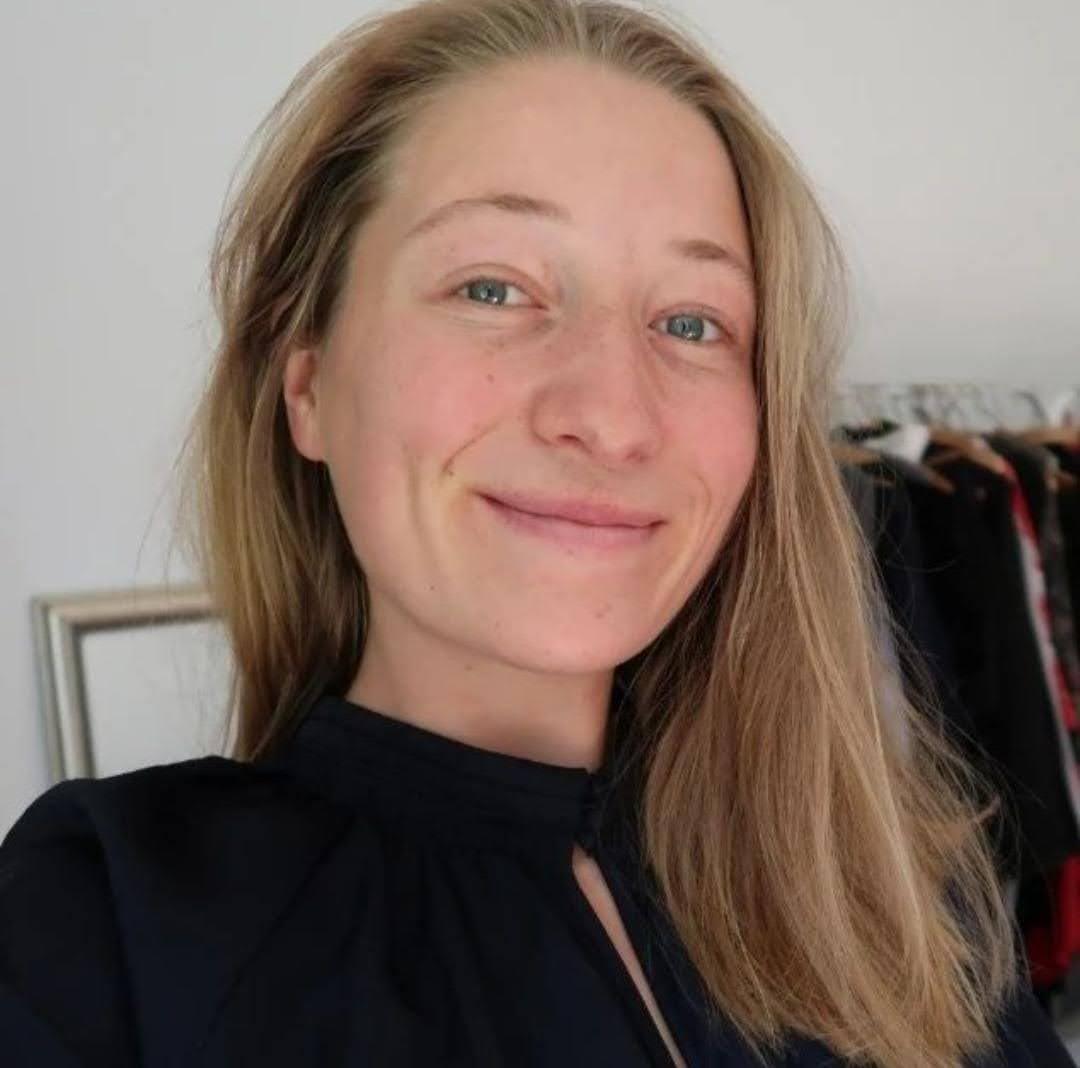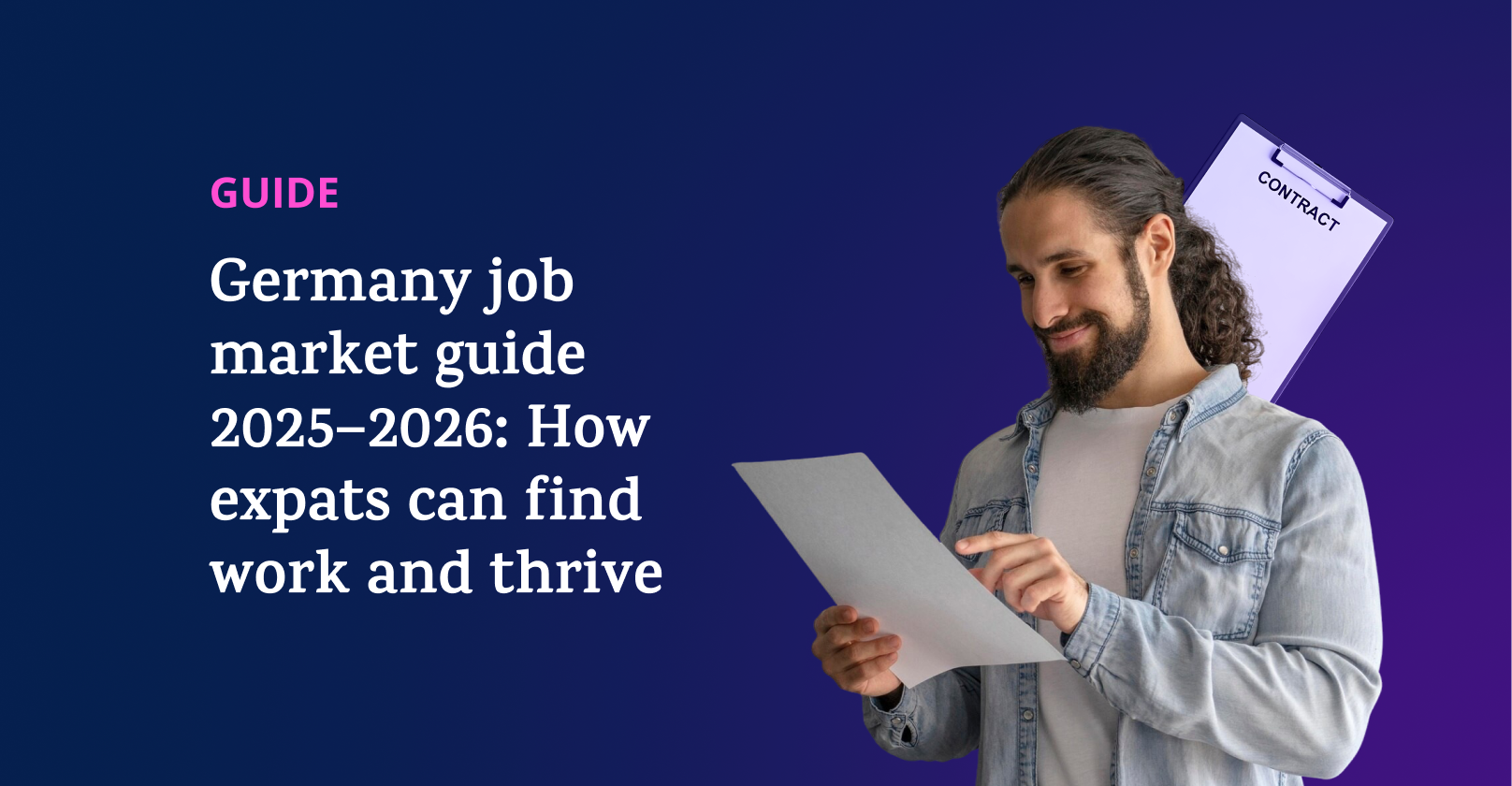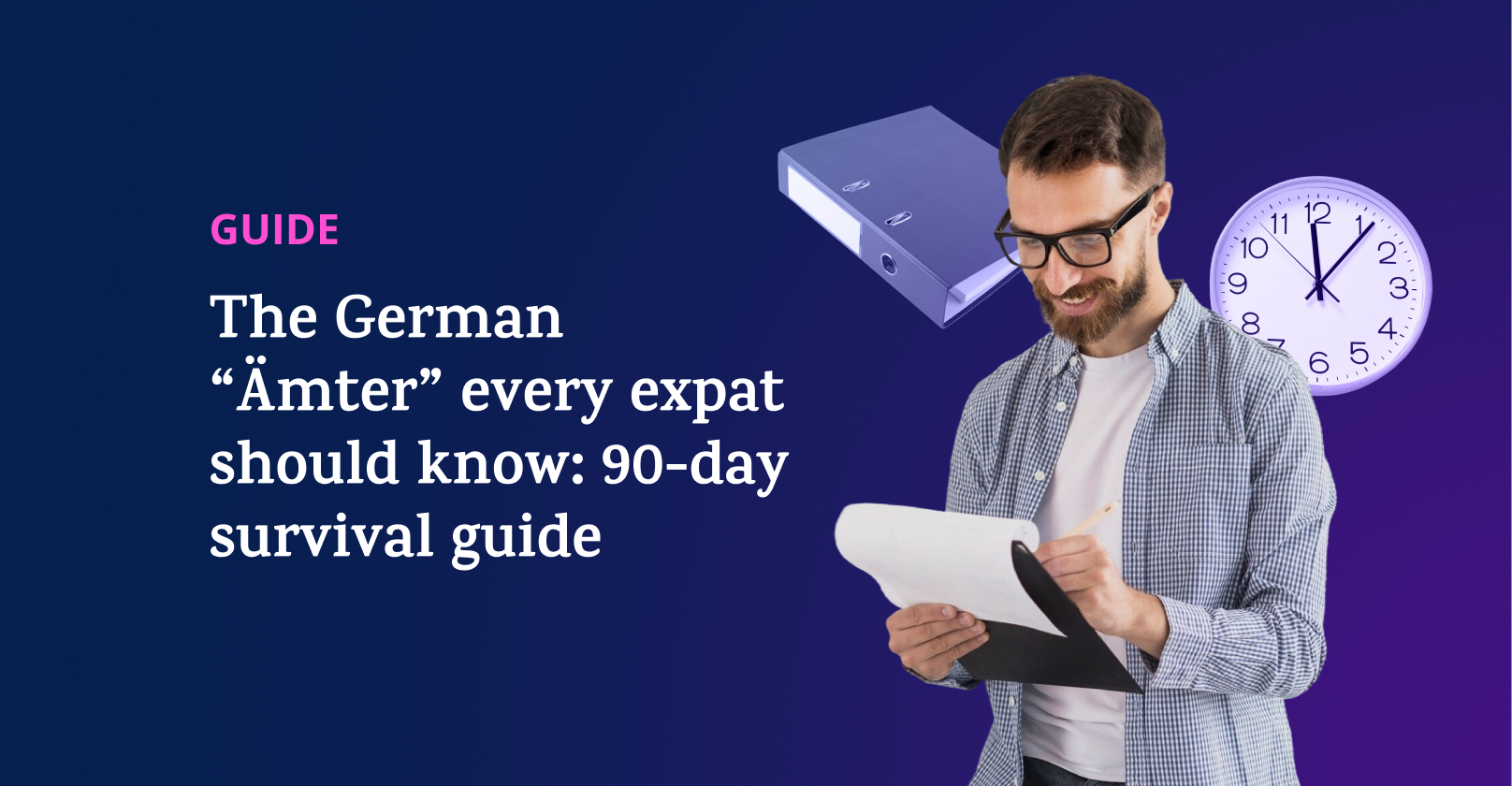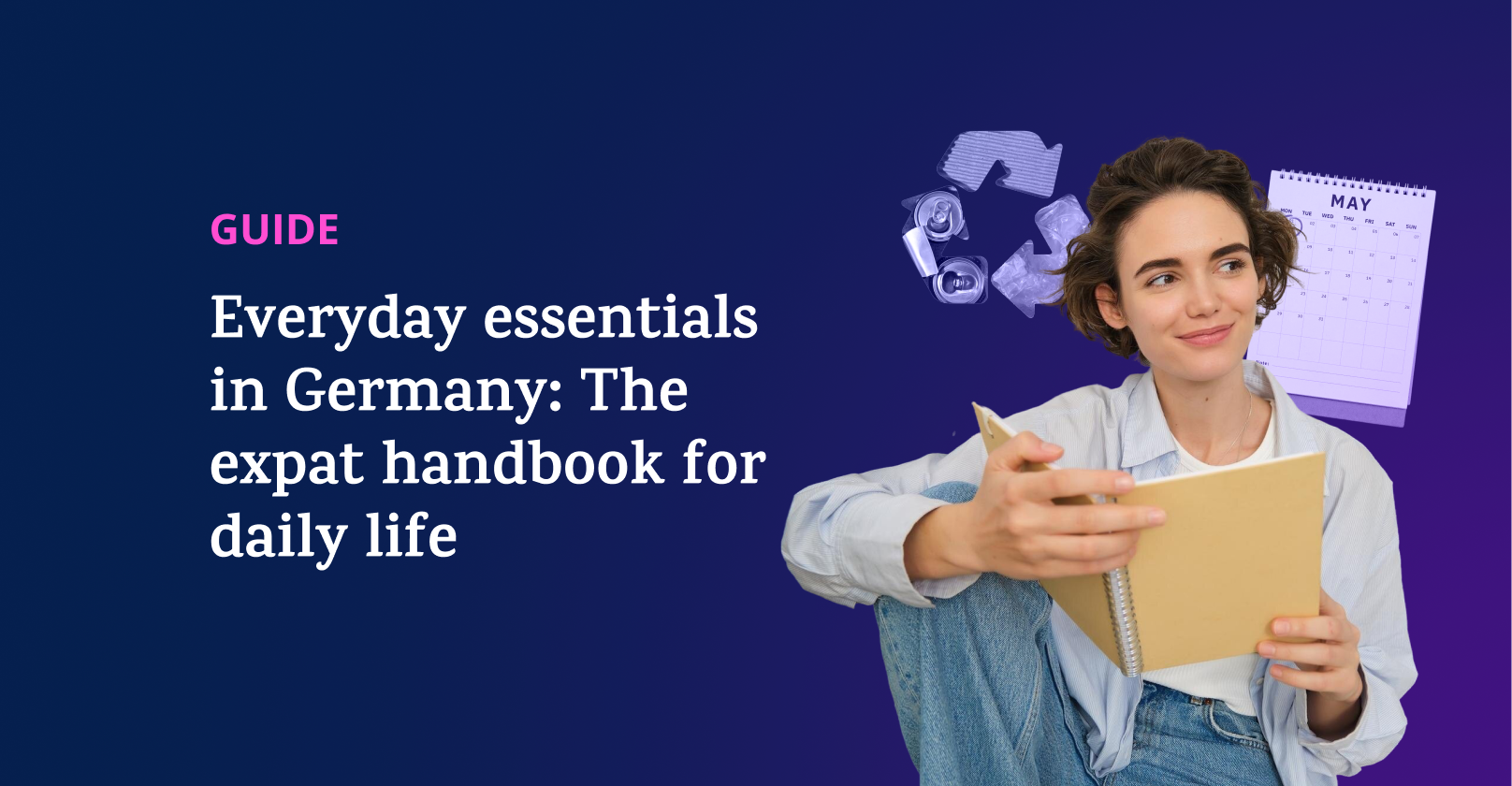Renting in Germany made simple: Vocabulary, contracts and survival tips
New to Germany? This guide explains key German rental terms like Wohnungssuche (apartment search), Mietvertrag (rental contract), Nebenkosten (extra costs) and Anmeldung (registration). Learn what they mean and how to use them confidently.
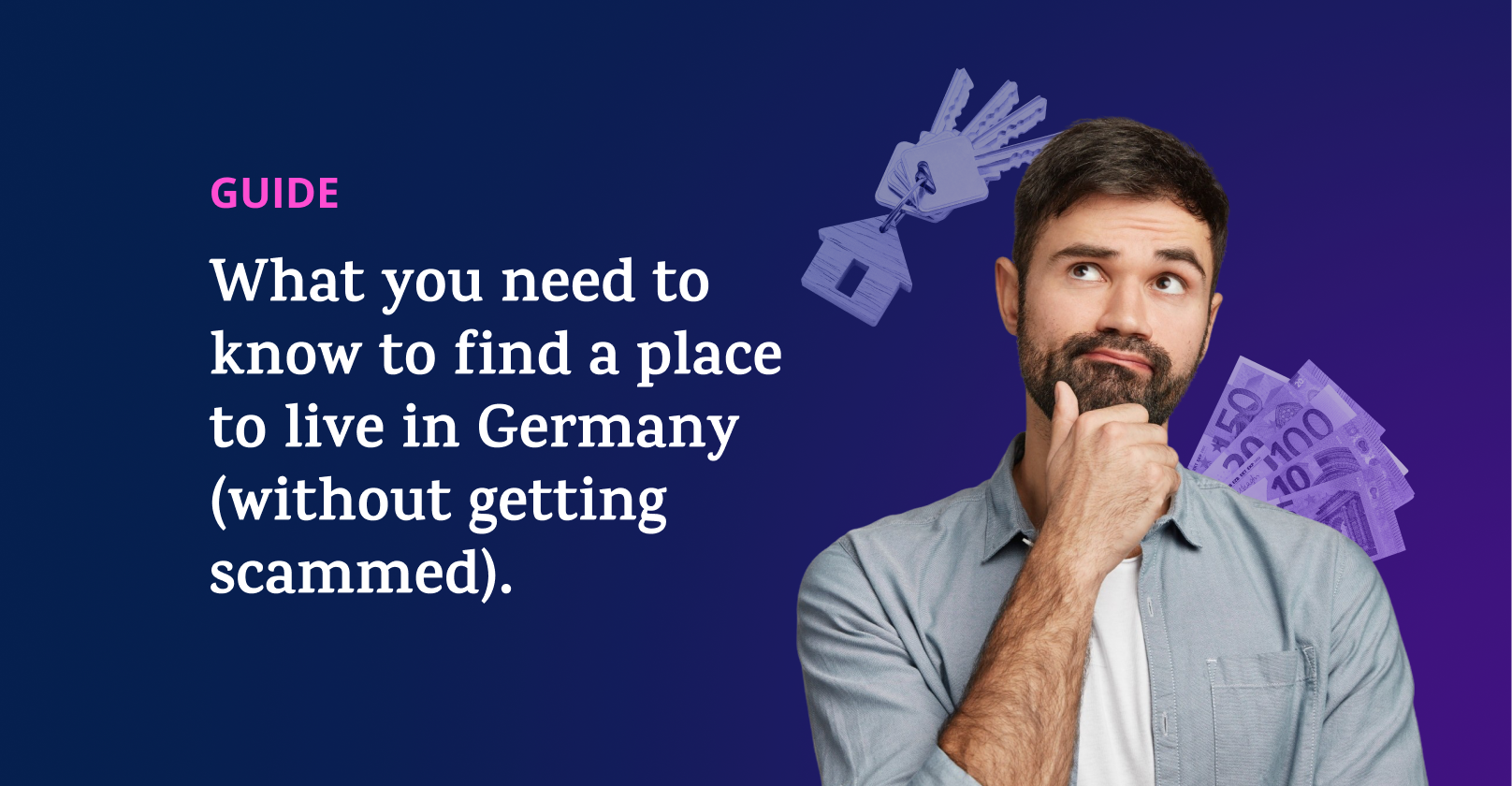
Renting in Germany means learning a few essential words. This guide covers key rental terms like Wohnungssuche (apartment hunt), Mietvertrag (rental contract), Nebenkosten (additional costs) and Anmeldung (registration). We’ll walk through each term, explain what it means, and show how it comes up in real-life rental situations.
Think of this guide as your all-purpose rental survival kit, so you won’t feel lost the next time your landlord casually drops Nebenkostenabrechnung (utility bill statement) into conversation.
- ‘Wohnungssuche’ (aka the great apartment hunt)
- ‘Bewerbungsunterlagen’: Paperwork that wins you a flat
- Viewing etiquette and speed game
- ‘Mietvertrag’: The contract that rules all
- ‘Nebenkosten’: Surprise! You’re paying more than just rent
- ‘Anmeldung’ and ‘Hausordnung’: Welcome to the apartment jungle
- ‘Mieterrechte’: Know your rights
- ‘Auszug’: Moving out without meltdowns
- Expat vocabulary boosts: Bonus words for language learners
- FAQs
‘Wohnungssuche’ (aka the great apartment hunt)
In short: A typical Wohnungssuche (apartment search) may involve online platforms like ImmobilienScout24, WG-Gesucht and Kleinanzeigen. But beware: you may need to suss out a few scams along the way.
Wohnungssuche means “apartment search” in German. It covers everything from using online platforms and working with real-estate agents to sniffing out the occasional too-good-to-be-true scam.
Pro tip: Always check the details twice, and don’t fall for wishful thinking. If the “dream flat” in the city center comes fully furnished for €300, it’s probably a scam.
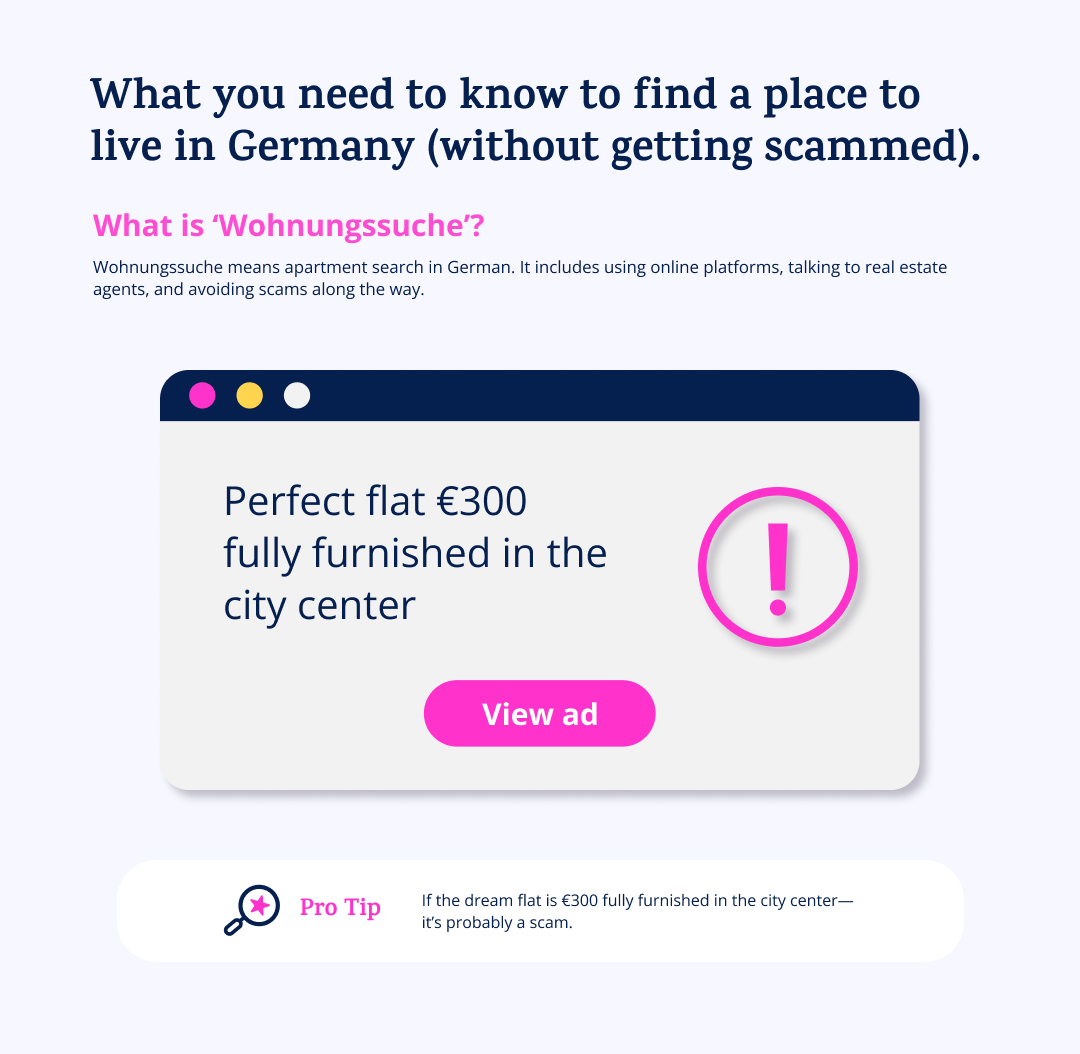
Where the flats are hiding: ‘Wohnungssuche’ platforms
In short: Start with ImmobilienScout24, WG-Gesucht and Kleinanzeigen — and watch out for offers that seem too good to be true. Make sure to set up alerts to receive notifications as soon as new ads are posted.
The main apartment search sites in Germany are ImmobilienScout24, WG-Gesucht and Kleinanzeigen.
Platform quick guide
- ImmobilienScout24: Most inventory; filters for size, price, pets, etc.
- WG-Gesucht: The go-to for shared flats (aka “stranger roommate roulette”).
- Kleinanzeigen: A direct sellers’ platform for everything from sofas to sublets — sometimes with actual photos, sometimes with a blurry shot of a door handle.
In practice, all of these online platforms can feel a bit like Pokémon Go for flats: you refresh the app obsessively, hoping an affordable apartment appears nearby.
Pro tip: Bookmark these sites and set up alerts — in competitive cities, a minute can be the difference between “new home” and “better luck next time.”
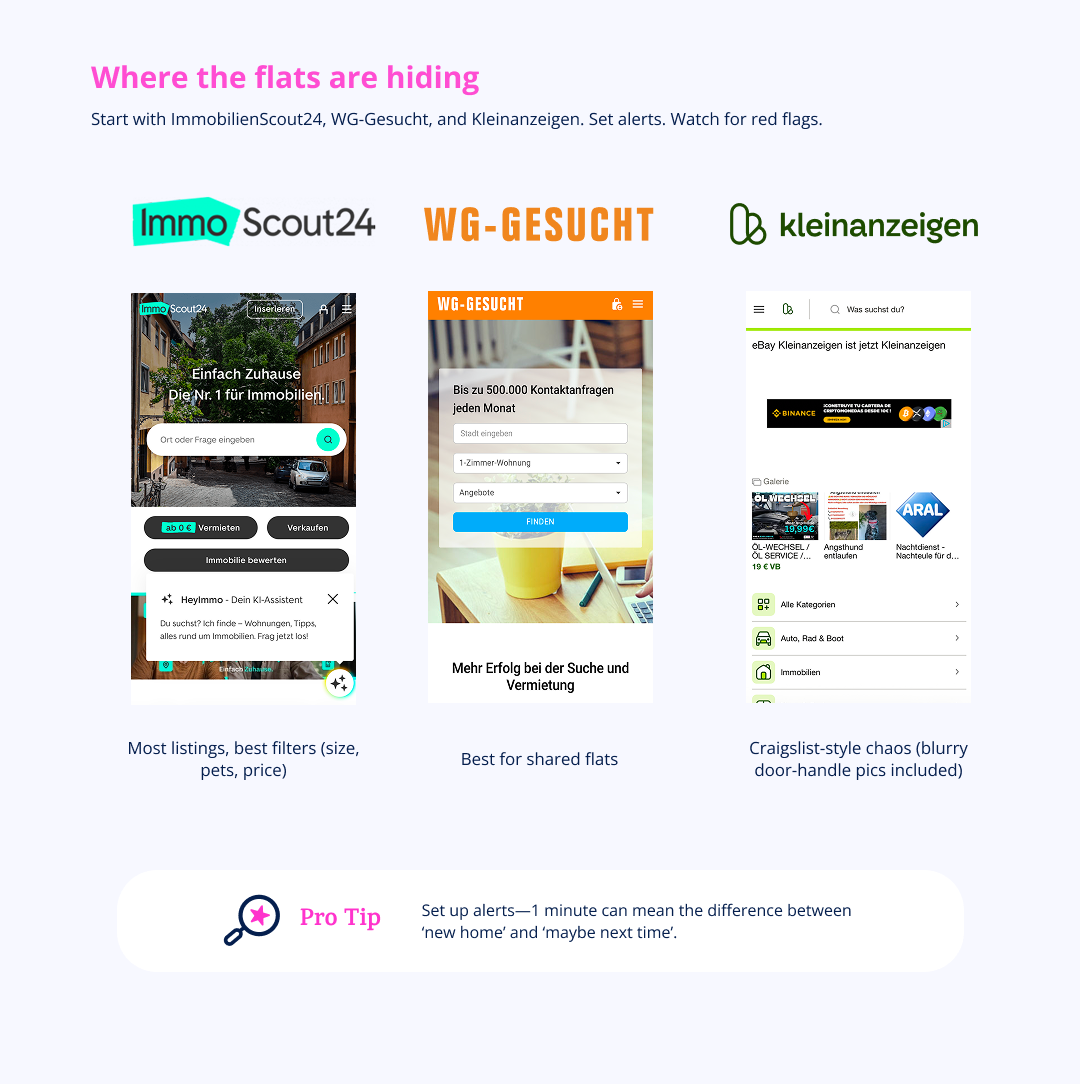
‘Makler’ and ‘Maklerprovision’: Meet the middleman
In short: A Makler is an agent, who may take a commission fee (Maklerprovision) depending on the agent and local rules (Bestellerprinzip).
A Makler is a real-estate agent who arranges listings, viewings and paperwork. The Maklerprovision is their commission fee; it’s usually paid by whoever commissioned the agent. In Germany, if you directly hire an agent yourself, their commission is legally limited to a maximum of two net cold monthly rents (plus VAT). It’s good to budget for this ahead of time, as the Maklerprovision is one of the biggest “hidden costs” of moving into a new place.
Pro tip: Expats are often stunned to discover that they can’t haggle their way out of paying a Maklerprovision. But if it’s in the contract, you must pay it — even if you found the place and did much of the heavy lifting yourself.
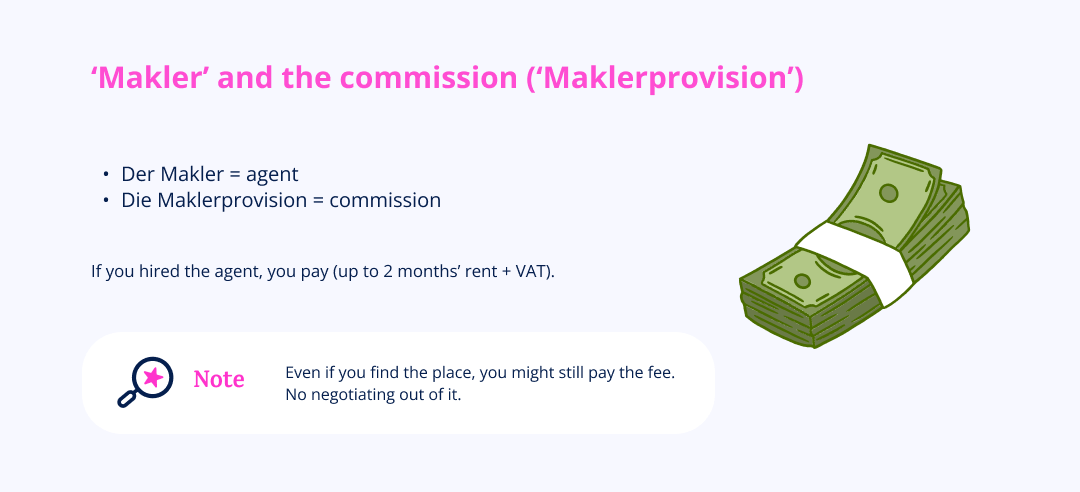
Spotting and dodging rental scams
In short: Never send money, IDs or deposits before you’ve signed a contract and verified ownership. Always use trusted platforms and verify the landlord or property manager.
Rental scams in Germany mostly target freshly arrived expats who aren’t familiar with local rules and norms. The golden rule: never transfer money before signing a legitimate rental contract. Ever.
Red flags:
- Requests for upfront cash payment without a contract = 🚩Run away fast.
- Vague, rushed contracts = 🚩If the details are missing or unclear, it probably isn’t legitimate. Always read carefully and ask questions if something isn’t clear.
- Too-cheap listings = 🚩Found an 80m² apartment in Mitte for €400? Think twice. If it sounds too perfect, it probably is.
Cultural side: Scams often target internationals, because landlords and agents assume they don’t yet know the rules.
To stay safe, do this instead:
- Stick to trusted platforms like ImmobilienScout24, WG-Gesucht and Kleinanzeigen.
- Insist on a written contract and official paperwork.
- Verify ownership/authority, and don’t hesitate to ask for references or proof. You may even want to cross-check the address and name.
Authority sources for more info:
Pro tip: Staying vigilant and informed is your best defense. Scams may be clever, but knowledge beats trickery every time.

‘Zwischenmiete’: Temporary pads and student swaps
In short: Zwischenmiete means a temporary rental, i.e., living in someone’s flat while they’re away. This arrangement can be ideal for short stays, internships or trying out a neighborhood before committing to it long-term.
Zwischenmiete is a temporary rental arrangement, often used by students, interns or anyone needing a short-term place. It literally means “between rents.” You move in while the official tenant is away and move out when they return.
Think of it like borrowing a friend’s apartment — but legally, with a contract (and usually some rent) involved. Students frequently swap apartments during internships.
For newcomers, Zwischenmiete can be a golden opportunity to explore different neighborhoods without committing long-term. It’s a bit like speed dating for apartments: you get a feel for the vibe, the commute and the local cafés before signing a full-year lease.

‘Bewerbungsunterlagen’: Paperwork that wins you a flat
In short: Bewerbungsunterlagen are your rental application documents — your “tenant résumé,” so to speak. A complete, neatly compiled set demonstrates to landlords that you’re reliable, organized and financially stable.
In Germany, applying for a flat is a bit like applying for a job. Bewerbungsunterlagen are the documents you need to rent a flat; they show your potential landlord that you’re reliable and financially responsible. Just like with a job application, the more complete and well-presented your paperwork, the better your chances.
A strong rental application usually includes:
- SCHUFA report (credit check)
- Payslips or proof of income
- Mietschuldenfreiheitsbescheinigung (confirmation that you owe no rent debt)
- Copy of ID or passport
- Anschreiben (short cover letter introducing yourself)*
The goal? Convince the landlord you’re the kind of tenant who pays on time, keeps the flat tidy, and doesn’t cause headaches.
*Only if it's a private landlord and could be skipped if you meet them personally during the viewing
SCHUFA: The credit report everyone’s talking about
In short: SCHUFA is Germany’s main credit report. Landlords use it to check your payment history and reliability.
Your SCHUFA report is the German version of a credit score. It’s essentially a snapshot of how reliably you’ve handled prior payments, loans and contracts. Landlords use it to help determine if you’re financially dependable.
How to get your SCHUFA:
- A free version, usually only for personal use, is available online here.
- A paid version, the one most landlords expect, can be ordered online here.
No SCHUFA yet? No problem! You can show:
- Bank statements proving regular income
- References from previous landlords or employers
- A Bürge (guarantor) who agrees to back your lease
‘Mietschuldenfreiheitsbescheinigung’: Try saying that three times fast
In short: This certificate from your previous landlord confirms you have no unpaid rent. It’s a simple but powerful trust booster.
A Mietschuldenfreiheitsbescheinigung (yes, it’s a mouthful) is a certificate from your previous landlord stating that you’ve paid all rent owed and left on good terms. While optional, it’s highly valued, especially in competitive markets like Berlin and Munich. You can easily download the form online.
Pronunciation tip: Break it into chunks — Miet-schul-den-frei-heits-be-schei-ni-gung. Say it slowly at first, then speed up as your tongue gets used to the twisty German magic. Once you’ve mastered it, it makes an excellent party trick at German gatherings.
‘Anschreiben’: Your rental cover letter
In short: The Anschreiben is a short cover letter you send with your rental application (Bewerbungsunterlagen). It introduces who you are, what you do and why you’re a great tenant.
Your Anschreiben is often your landlord's first impression of you. It’s a short cover letter you send with your Bewerbungsunterlagen. It introduces you, explains why you’re interested in the apartment, and shows that you’re reliable and responsible.
Ideally, you’ll want to come across as a polite guest, rather than a desperate applicant. Most landlords simply want to see that you’re respectful, organized and easy to communicate with. Keep it short, friendly and professional — three or four sentences should suffice.
Example German template:
Sehr geehrte/r [Name des Vermieters],
Mein Name ist [Ihr Name] und ich bin an Ihrer Wohnung in [Stadt/Bezirk] sehr interessiert. Ich arbeite als [Beruf] und suche ein ruhiges, gepflegtes Zuhause. Ich freue mich sehr über die Möglichkeit, die Wohnung zu besichtigen. Vielen Dank für Ihre Zeit und Rückmeldung.
Translation:
Dear [Landlord’s Name],
My name is [Your Name] and I am very interested in your apartment in [City/Neighborhood]. I work as [Job] and am looking for a quiet, well-maintained home. I would be delighted to have the opportunity to view the apartment. Thank you very much for your time and response.
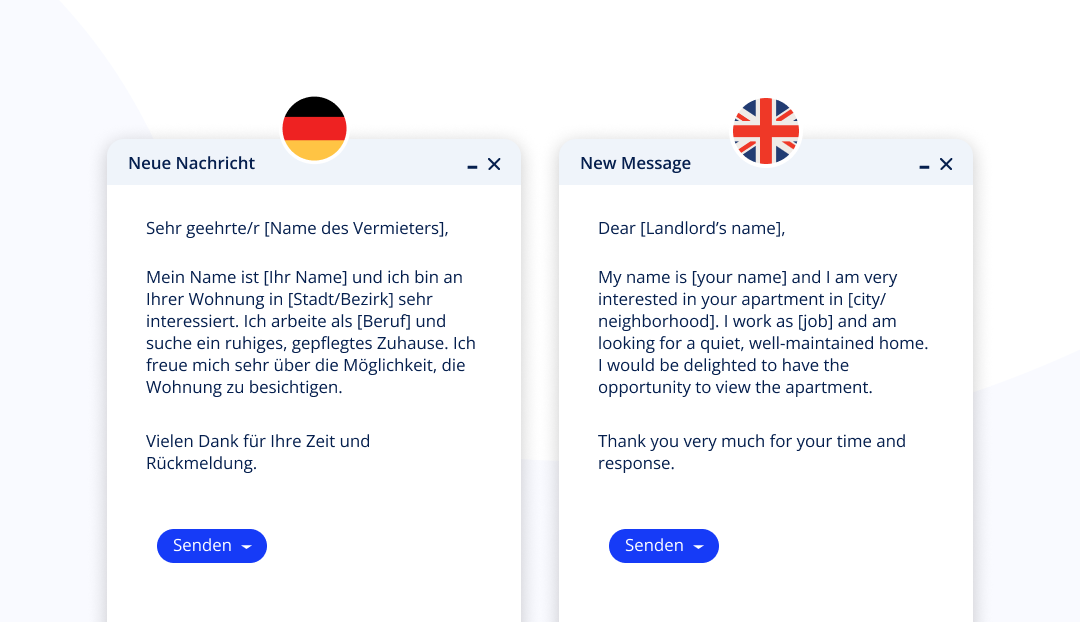
Viewing etiquette and speed game
In short: Apartment viewings in Germany are competitive. Arrive early, bring your documents, and send your application the same day.
Apartment viewings in Germany can be a tough scene, often with a long queue of applicants visiting the flat at the same time.
It’s like speed dating for apartments: everyone shows up, smiles politely, asks the “right” questions and hopes the landlord remembers their name. Bring all your Bewerbungsunterlagen, be punctual and keep small talk light.
Group viewings vs. private showings
In short: Massenbesichtigungen are large, open group viewings. Private viewings are quieter and typically arranged by appointment only.
In Germany, there are two main types of apartment viewings:
- Group viewings (Massenbesichtigung): Many applicants tour the apartment at once. These viewings often feel like a casting call: everyone smiles, asks polite questions and silently competes for the landlord’s favor.
- Private showings: Smaller, calmer and usually by appointment. You get more time to ask questions, but these showings are often reserved for shortlisted applicants.
Cultural note: Germans value punctuality like they value good bread. Arrive on time (even a few minutes early) and show respect during visits. Small gestures — greeting everyone politely, and keeping your phone tucked away — can make a surprisingly big impression on landlords.
The ‘Apply on the same day’ reality check
In short: In large cities especially, flats go fast. To improve your chances, send your full application within hours of the viewing.
In big cities like Berlin and Munich, apartments can be gone the same day they’re listed. The best course of action is to apply immediately, which means sending your Bewerbungsunterlagen to the landlord or agent directly after the viewing.
To be ready, have your documents prepared in advance. Think of it like a relay race: the apartment is the baton, and your documents are your running shoes. The faster and more complete your application, the better your chance of crossing the finish line first!
‘Mietvertrag’: The contract that rules all
In short: The Mietvertrag is your rental contract. It defines the rent, deposit, lease length and house rules — in other words, everything that shapes your rights and duties as a tenant.
Your Mietvertrag is the blueprint of your rental life in Germany. It lists the monthly rent, deposit, length of lease, rules about pets, renovations, subletting and more. If it relates to your rights and duties as a tenant, it should be in the Mietvertrag.
Read it carefully before signing — and once again before moving out — to avoid accidentally angering your landlord.
Lease types: Forever homes vs. temporary digs
In short: German leases are either unbefristet (open-ended) or befristet (fixed-term). The difference determines how long you can stay and how easily you can renew your lease.
In Germany, leases are either unbefristet or befristet.
- Unbefristet: The lease carries no end date. You can stay as long as you like, though you must respect the notice period (usually three months).
- Befristet: The lease ends on a specific date. This lease type is often used for temporary rentals like internships, student housing or project-based moves.
Many expats start with fixed-term leases, which tend to be more flexible and easier to find. If you want to stay beyond the agreed period, you’ll likely need to negotiate an extension before the contract expires — but be ready to provide updated references or documents.
Rent talk: ’Kaltmiete’, ‘Warmmiete’ and ‘Nebenkosten’, oh my!
In short: Kaltmiete is the base rent (space only); Warmmiete includes the base rent plus heating; Nebenkosten include extra costs like water, trash, cleaning and shared utilities.
Understanding rent terms in Germany can save you budget shock:
- Kaltmiete is the basic rent — just the space itself, without utilities.
- Warmmiete adds heating costs, giving you a better sense of what you’ll actually pay each month.
- Nebenkosten are the extra utility and building costs paid on top of the base rent. These include shared costs for water, trash and hallway lighting.
Always check what’s included in the Warmmiete before signing. Those extras can turn a bargain flat into an expensive surprise when the first utility statement arrives.
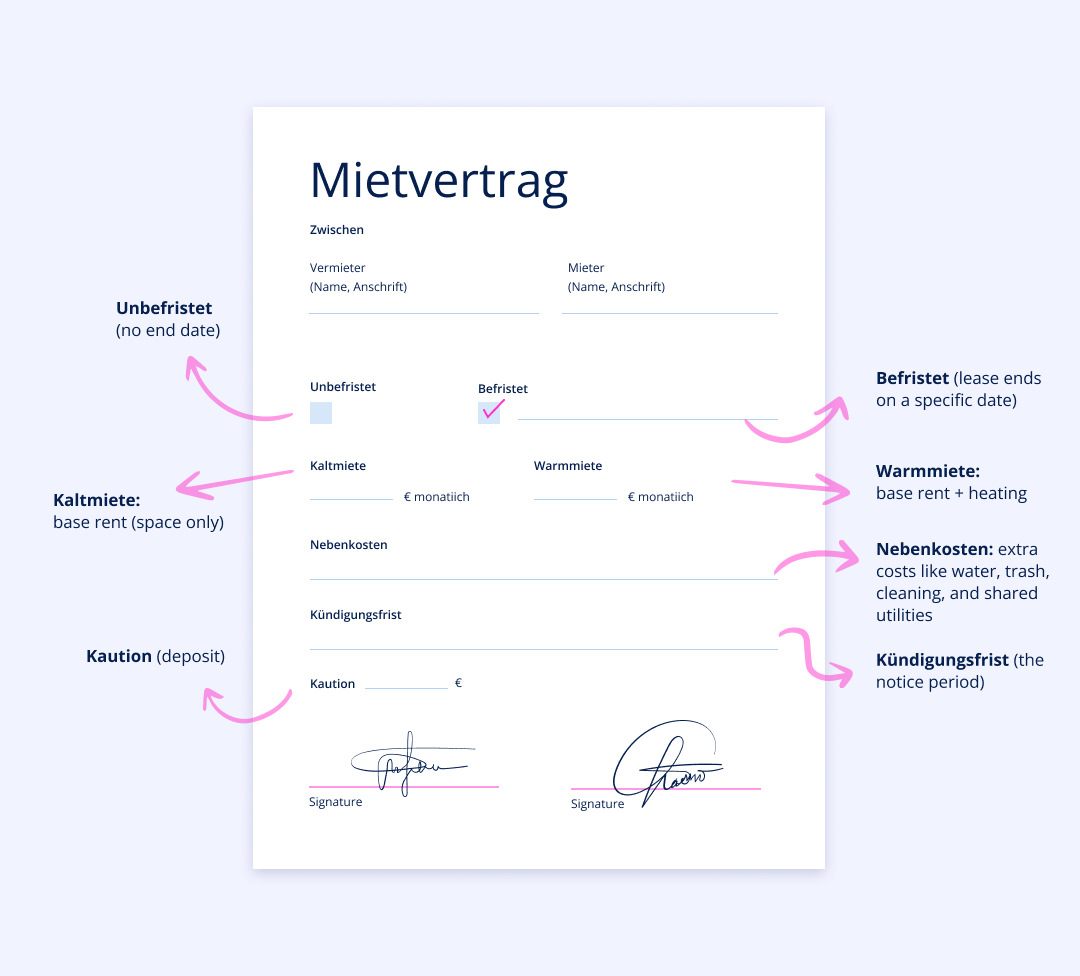
Key clauses you’ll want to read twice
In short: Always check the notice period, deposit, and rules on pets, subletting, and renovations before signing.
When reading your Mietvertrag, pay close attention to key clauses like:
- Kündigungsfrist (notice period): This tells you how far in advance you must give notice if you want to move out. In most leases, it’s three months, though some agreements may vary.
- Kaution (deposit): Usually up to three months’ rent, held to cover damages or unpaid rent. It’s refundable if you leave the apartment in good condition.
- Other legal traps: Look out for clauses about subletting, pets or alterations to the apartment.
Some clauses can seem strict. You may chafe at restrictions on subletting, hanging pictures in certain rooms or painting your walls neon green. But landlords include these to protect the property and avoid conflicts. In reality, they’re just the fine print that keeps your home (and your deposit) safe.
These are essentially the “terms and conditions” for your apartment, and they’re worth paying attention to. Sure, it can be boring to read the fine print, but skipping it can turn your dream flat into a surprise adventure you didn’t sign up for.
‘Nebenkosten’: Surprise! You’re paying more than just rent
In short: Nebenkosten are the extra monthly costs added to your base rent (Kaltmiete). They cover utilities and shared building expenses. What you actually pay each month is the Warmmiete (rent + heating + extras).
Nebenkosten are your apartment’s “behind the scenes” costs that sit on top of your base rent (Kaltmiete). They usually include costs for:
- heating
- water
- trash collection
- building cleaning and hallway lighting
- maintenance or gardening fees
A Kaltmiete online can look tempting, but don’t let it deceive you.
So, when you’re apartment hunting in Germany, don’t fall for the low base rent alone. Always check the Nebenkosten breakdown, or you might end up with a not-so-warm surprise when the first invoice lands in your mailbox.
The big three: Electricity, gas and heating
In short: Electricity contracts are your responsibility. Gas and heating are often part of Nebenkosten, but always confirm what’s included in your Warmmiete.
Strom (electricity), Gas (gas) and Heizkosten (heating costs) make up the core of your utility life in Germany.
- Gas and heating are usually part of your Nebenkosten.
- Electricity is different. You typically must set up a contract directly with a provider.
Pro tip: Always ask your Vermieter (landlord) exactly what’s covered in the Warmmiete. This can include heating, waste collection and even corridor cleaning services. Knowing what’s included upfront can help you keep your monthly budget on track.
Switching providers
If you’re setting up electricity, gas or internet, you can choose/switch your provider. Follow these steps to avoid headaches:
- Compare offers: Use platforms like Check24 or Verivox to find deals on electricity, gas or internet.
- Read the fine print: Look for bonuses, contract length and notice periods.
- Submit meter readings (Zählerstände): Take photos for proof.
- Sign the contract: Digital or paper; make sure dates and rates match your research.
- Track start and end dates: Avoid overlapping bills or paying for your predecessor’s usage.
- Keep records: Store contracts, confirmation emails and meter photos for future reference.
Pro tip: Snap photos of your meters when moving in. That time-stamped evidence can save you from being billed for your predecessor’s all-night heating marathons.
‘Vorauszahlung’ vs. ‘Abrechnung’: Pay now, calculate later
In short: Vorauszahlungen are monthly prepayments for estimated utility use. Once a year, you’ll receive an Abrechnung (annual statement) comparing estimates to actual costs.
In Germany, utilities and Nebenkosten are usually paid as monthly pre-payments (Vorauszahlungen). These are estimates based on the size of your flat and your expected consumption. In the year following your rental period, you’ll receive the Abrechnung (annual statement), which compares what you paid with what you actually used.
If your Vorauszahlungen were higher than your actual usage, you’ll receive a refund (best-case scenario: it feels like finding forgotten cash in an old winter jacket). If they were too low, you’ll receive a Nachzahlung (back payment). That one’s less fun — it’s more like opening your bank app after a holiday weekend.
Example:
You pay €150 per month for heating → €1,800 per year.
- If your actual use was €1,600, you’ll receive €200 back.
- If your actual use was €2,200, you’ll owe €400.
The moral of the story? Keep an eye on your annual statement. It’s not junk mail; it’s the final report card of your utility habits.
‘Anmeldung’ and ‘Hausordnung’: Welcome to the apartment jungle
Renting in Germany comes with two rites of passage: registering your new address (Anmeldung) and obeying the building rules (Hausordnung). One is paperwork, the other is lifestyle. Both, sadly, are non-negotiable.
‘Anmeldung’: The first bureaucratic dance
In short: Your Anmeldung is your official address registration at the Bürgeramt (civil office). You’ll need it when you apply for a tax ID, health insurance, bank account and internet contract.
The Anmeldung is the golden key to living in Germany legally. It’s the process of registering your address at the local Bürgeramt (civil office). Without it, you can’t get a tax ID, register for health insurance, open many types of bank accounts or even set up Wi-Fi in your home. In other words: no Anmeldung, no fully functioning life in Germany.
‘Anmeldung’: Step-by-step documents checklist
- Book an appointment (Termin) at your local Bürgeramt. Early booking helps avoid long waits.
- Bring these documents:
- Passport or ID – your primary identification
- Rental contract (Mietvertrag) – proves you have a place to register
- Landlord confirmation form (Wohnungsgeberbestätigung) – signed by your landlord to confirm you live at the designated address
- Completed registration form (Anmeldeformular) – usually available online or at the office; fill it out carefully to avoid errors
- Optional extras – some offices may ask for proof of health insurance or marriage certificates, if relevant
- Submit everything in person. Bring originals and copies.
- Receive confirmation (Meldebescheinigung). Keep this document safe; you’ll need it for banks, your tax ID and future contracts.
Pro tip: Double-check spellings, dates and signatures. Even minor mistakes can mean a second trip to the office — and nobody wants that dance repeated.
Common form words:
- Familienstand = marital status
- Staatsangehörigkeit = nationality
- Wohnungsgeberbestätigung = landlord confirmation
- Anmeldedatum = date of registration
Conquer this first dance, and you’ll unlock the rest of your German adventure.
‘Hausordnung’: The rules of your apartment
In short: Hausordnung is the building’s rulebook. It covers quiet hours, cleaning schedules and recycling — and yes, everyone takes it seriously.
Every building in Germany has its own Hausordnung (literally “house order”). It’s basically the Constitution of your stairwell, covering everything from when you can do laundry to how you sort your recycling. While your Mietvertrag sets the legal framework, the Hausordnung shapes your day-to-day coexistence with neighbors.
At the heart of it all are:
- Ruhezeiten (quiet hours): No loud music, drilling or vacuuming after 10 p.m., before 7 a.m. and all day Sunday.
- Trash sorting: Expect multiple bins (paper, plastics, organic, residual, maybe even glass). Mixing them is social blasphemy.
- Stairwell sweeping: In many buildings, tenants take turns cleaning the communal areas.
- Neighbor etiquette: Park bikes considerately, greet people and keep hallways tidy.
If your Hausordnung is written in dense legal German, consider translating it. It may feel tedious, but knowing the difference between acceptable recycling and bin chaos can save you from friction with the neighbors.
Together, Anmeldung and Hausordnung mark your official initiation into German renting life. The state now knows where you live, and your neighbors now know exactly when you’re being too loud.
Insurance 101: When life (or pipes) go wrong
In short: Two optional but highly recommended insurances protect renters: Haftpflichtversicherung (liability) and Hausratversicherung (contents).
In Germany, insurance is practically a hobby. For renters, two types matter most:
- Haftpflichtversicherung (personal liability insurance): This covers damage you cause to someone else’s property. Spill red wine on the landlord’s carpet or flood your downstairs neighbor? This policy saves you.
- Hausratversicherung (household contents insurance): This protects your belongings — furniture, electronics, clothes — against fire, theft or water damage.
Together, these insurances turn catastrophic “oops” moments into manageable paperwork. Many Germans consider them as essential as having a bike lock. Because in Germany, it’s not a question of if bureaucracy will come knocking — it’s a question of when.
‘Mieterrechte’: Know your rights
In short: Mieterrechte (tenant rights) are your legal safety net in Germany. They protect you from sudden rent hikes, unfair evictions and unresolved issues like mold or broken heating.
Mieterrechte (tenant rights) are your legal safety net when things get messy — or moldy. German rental law is famously tenant-friendly, which means landlords can’t just raise your rent overnight, kick you out without notice or ignore serious issues like damp walls or broken heating.
‘Mietminderung’: When cold showers might lead to lower rent
In short: Mietminderung is the legal right to reduce rent when serious problems (like mold or broken heating) aren’t fixed promptly.
One of the strongest tools in a tenant’s toolkit is the Mietminderung — the right to reduce your rent if your apartment has serious, unresolved issues. The logic is simple: if you’re not getting the full use of your home, you shouldn’t have to pay the full price.
What qualifies?
- Heating that doesn’t work in winter
- Persistent mold on the walls
- Broken water pipes
- Excessive construction noise
How it works:
- Report the issue in writing (schriftliche Mängelanzeige) to your landlord right away and give a reasonable deadline to address it.
- Document everything. Take photos, keep records of emails and note room temperatures if the heating is out.
- Apply the reduction. If nothing changes, you can lower your rent proportionally.
Pro tip: The exact percentage of reduction depends on the severity of the defect. German courts can reference lots of case law on this. When in doubt, your local Mieterverein (tenant association) can advise on how much is appropriate.
‘Mietpreisbremse’: How to pump the brakes on your rent
In short: The Mietpreisbremse limits how much landlords can charge for new leases in high-demand areas — usually no more than 10% above the local average rent (Mietspiegel).
Rents in German cities have been climbing at an alarming rate, so the government introduced the Mietpreisbremse (“rent brake”) to keep things under control. In designated “tight housing markets” (angespannte Wohnungsmärkte), landlords can’t charge more than 10% above the local average rent (Mietspiegel).
Where it applies:
- Berlin
- Munich
- Hamburg
- Frankfurt am Main
- Stuttgart
- Cologne
- …and dozens of other cities officially listed by each federal state (Bundesland)
Pro tip: If you’re moving to Germany, check whether your city is on the Mietpreisbremse list. It can make a big difference to your wallet.
Key exceptions/loopholes:
- New construction (Neubau) → Apartments first rented out after October 1, 2014 are completely exempt.
- Major renovations (umfassende Modernisierung) → If the landlord has invested a certain amount in upgrading the flat, it’s treated almost like new construction and may be exempt from the brake.
- The previous rent was already higher → If the last tenant was paying more than the Mietpreisbremse allows, the landlord can continue charging the same.
- Furnished flats and temporary lets
‘Kündigungsschutz’: You can’t just kick me out!
In short: Kündigungsschutz prevents landlords from evicting tenants without a valid legal reason and proper notice period.
One of the great comforts of renting in Germany is knowing that your landlord can’t simply tell you to pack your bags overnight. Kündigungsschutz guarantees protection against unfair eviction.
When it applies:
- Landlords need a legal reason to terminate your lease:
- Eigenbedarf (they or close family members want to move in)
- Serious contract breaches (e.g., months of unpaid rent)
- Even then, they must respect the official notice periods (Kündigungsfristen), which range from three to nine months depending on the length of the existing lease.
What it means for you:
- You can object to eviction if it would cause serious hardship (age, illness, family situation, etc.).
- Any termination must be in writing, with specific reasons listed.
- If you’re unsure, check with your Mieterverein or a lawyer before responding.
Pro tip: A landlord’s letter isn’t the final word. If it feels unfair, get advice — tenant associations exist precisely for this.
‘Auszug’: Moving out without meltdowns
In short: Auszug (moving out) in Germany involves paperwork, inspections and sometimes repainting. Follow the checklist to protect your Kaution (deposit) and avoid last-minute chaos.
Moving out in Germany isn’t just about packing boxes. It also involves paperwork, protocols and sometimes a splash of paint. Your Auszug (move-out) comes with its own checklist of tasks, and skipping one could cost you part of your Kaution (deposit).
Your move-out essentials:
- Wohnungsübergabeprotokoll = Handover checklist of your flat’s condition
- Kaution = Security deposit refund
- Abmeldung = Official deregistration of your address
‘Wohnungsübergabeprotokoll’: Say it with a checklist
In short: This document records the flat’s condition when you move in or out. It protects you from paying for damages you didn’t cause.
The Wohnungsübergabeprotokoll is the official handover document you fill out when moving in or moving out. It’s a checklist for your apartment’s condition. Every scratch, dent or stain gets noted, signed and time-stamped.
Without this document, you risk losing part of your Kaution over damage you didn’t cause. With it, you have proof of the flat’s state and a solid reference if disputes arise.
Tips for a smooth handover:
- Take photos of every room, corner and detail.
- Note existing damages clearly in the protocol.
- Both the tenant and the landlord should sign the document.
- Keep a copy for yourself — it’s your safety net.
The Wohnungsübergabeprotokoll is your legal “receipt for peace of mind.” Treat it seriously, and your deposit stays yours — no sneaky deductions allowed.
Getting your ‘Kaution’ back
In short: Your Kaution (security deposit) is usually one to three months’ rent. To get it back, the flat must be clean, damage-free and well-documented.
The Kaution (security deposit) is usually one to three months’ rent, held by your landlord to cover damages or unpaid bills. Getting it back isn’t always instant; German law allows landlords to review the apartment and any utility reconciliations before returning your money.
Typical deductions:
- Damages (holes in walls, broken fixtures, etc.)
- Missing keys or remotes
- Cleaning or repainting costs
- Outstanding utility bills
Pro tips to get your full deposit back:
- Clean thoroughly: Kitchen, bathroom, floors, windows — leave it all spotless.
- Repaint walls if your lease requires Schönheitsreparaturen (cosmetic repairs).
- Document everything: Take photos during the final walkthrough to back up your case.
- Schedule the handover (Wohnungsübergabe) with the landlord and review the Übergabeprotokoll together.
‘Abmeldung’
In short: Abmeldung is the deregistration of your address when you move out or leave Germany. Without it, you might still get bills at your old address.
The Abmeldung is your official deregistration when leaving a flat or moving out of a city. It’s the reverse of the Anmeldung, and just as important. If you move within Germany, you don't need to abmelden (deregister); simply go to your new Bürgeramt and anmelden (register) again at your new place of residence.
Why it matters:
- To close utility contracts (Strom, Gas, Internet) smoothly
- To prevent surprise bills months later for a flat you no longer live in
- To ensure your new city registration (Anmeldung) goes off without any issues
How it works:
- Book an appointment at your local Bürgeramt.
- Bring your ID and proof of your new address (or a letter confirming your move abroad).
- Fill out the Abmeldeformular.
- Receive your Abmeldebestätigung (deregistration certificate).
Playful reminder: Skipping the Abmeldung is like ignoring the fine print of a thriller — the sequel involves letters from the Bürgeramt haunting you months later.
Expat vocabulary boosts: Bonus words for language learners
Want to sound like a rental pro? Here’s a small arsenal of extra words to impress your landlord — or at least confuse them less. Knowing these terms can save time, prevent misunderstandings and help you navigate Germany’s rental world with confidence.
Bonus words to know:
- Wohnfläche – living space (in square meters)
- Nebenkostenabrechnung – the annual statement of extra costs
- Untermiete – sublet
- Mietvertrag verlängern – extending your lease
- Schönheitsreparaturen – cosmetic repairs
- Hausverwaltung – property management
- Mieterverein – tenant association
- Eigenbedarf – landlord wants the flat for personal use
- Kündigungsfrist – notice period
- Warmmiete/Kaltmiete – rent with or without heating/other utilities
Pro tip: Even sprinkling a few of these words into conversation or emails shows you know the system — and makes communication smoother.
Banking, credit and bureaucracy buzzwords
Navigating German rentals often means wading through banking forms, credit checks and a swamp of official terminology. Here’s a mini glossary to keep you fluent in rental bureaucracy:
- SCHUFA – Germany’s main credit report; landlords often require it to prove you pay your bills on time.
- Selbstauskunft – a self-disclosure form listing your income, employment and personal info for landlords
- Girokonto – your everyday checking account; usually needed for rent transfers and direct debits
- Überweisung – bank transfer (your monthly rent will almost always be paid this way)
- Lastschrift – direct debit authorization; lets landlords or utility providers automatically pull payments
- Bürgschaft – a guarantee, sometimes required if you lack a long credit history or SCHUFA score
- Mietkaution – security deposit; often held in a blocked account (Kautionskonto)
- Bürgerservice – citizen services; the umbrella term for offices like the Bürgeramt where you register your address
- Meldebescheinigung – proof of registration; sometimes needed for contracts or bank accounts
- Vorauszahlung – monthly prepayment for utilities; reconciled annually
Pro tip: Master these and you’ll fly through forms like a native — or at least look like one.
Local lingo: Berlin is NOT Freiburg
German rental vocabulary isn’t one-size-fits-all. Depending on the city or region, terms and slang can change — sometimes subtly, sometimes hilariously. Knowing these quirks can make you sound like a local instead of a wide-eyed expat.
Urban vs. rural:
- Altbau – In Berlin, this usually means charming pre-1945 apartments with high ceilings and creaky floors. In smaller towns, “Altbau” might just mean “old building.”
- Dachgeschoss – In cities, this signals a trendy top-floor apartment, often with a quirky layout. In the countryside, it might just be a cramped attic you hope doesn’t leak.
- WG (Wohngemeinschaft) – In Berlin or Munich, shared flats are a lifestyle choice; in smaller towns, they might be a rare necessity.
Fun local slang:
- Kiez – neighborhood, but with Berlin personality. “I live in a nice Kiez” signals more than just an address.
- Bude – informal word for flat or apartment; “Meine Bude” = my pad
- Schönheitsreparaturen – often shortened humorously to Schönis, especially among students discussing painting duties
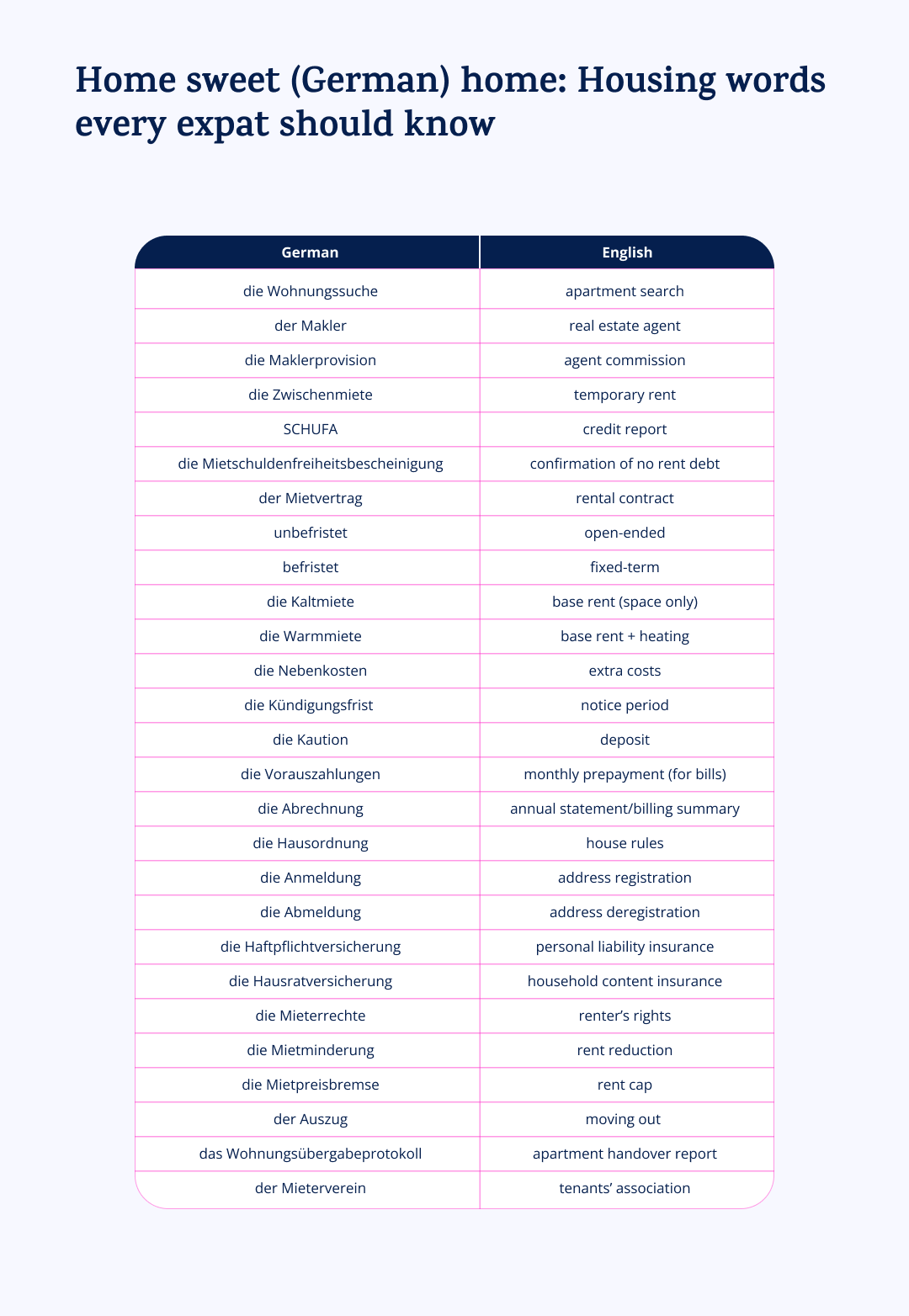
FAQs
How do I find an apartment in Germany?
Start your search on trusted sites like ImmobilienScout24, WG-Gesucht, or Kleinanzeigen. In big cities, set up alerts and apply fast — apartments can disappear within hours.
What’s the difference between 'Kaltmiete' and 'Warmmiete'?
Kaltmiete is the basic rent for the space only, while Warmmiete includes heating and extra costs (Nebenkosten) such as water, garbage, and hallway cleaning.
What are 'Nebenkosten' and how are they calculated?
Nebenkosten are your extra housing costs, covering things like heating, water, trash, and building maintenance. You pay a monthly estimate (Vorauszahlung), later adjusted in your annual statement (Abrechnung).
Can foreigners rent apartments easily in Germany?
Yes — but landlords often prefer applicants with stable income, SCHUFA reports, and full documentation. Providing clear paperwork and references helps a lot.
How much deposit ('Kaution') do landlords usually ask for?
Usually between one and three months’ rent, held as security against damages or unpaid bills. It must be returned when you move out if the flat is in good condition.
Ready to speak fluent ‘Tenant’? Your next steps
Congratulations! By now, you’ve unlocked the essential vocabulary, rules and survival strategies for renting in Germany. From Wohnungssuche and Mietvertrag to Nebenkosten, Anmeldung and Mieterrechte, you now know not only what the words mean, but how to put them into practice without melting down.
Mastering this rental lexicon makes life easier. You’ll fill out forms confidently, impress landlords, dodge common pitfalls and even navigate quirky local lingo without blinking.
What’s next? Maybe it’s discovering the charm of your Kiez, mastering the nuances of Hausordnung or simply feeling at home in your new city.
Take a moment to celebrate your progress: you’ve gone from wide-eyed newcomer to rental-savvy pro. Keep practicing the words, keep asking questions and don’t shy away from a little humor — bureaucracy is easier to handle when you can laugh at it.
You’ve got this. Now go forth and conquer the German rental world, one Mietvertrag at a time.

Begin your personal language journey
- Courses tailored to your learning needs
- Qualified teachers, small class sizes
- Expert-designed curriculum
- Live classes with native-level teachers


We do our best to keep this guide accurate and up to date, but rules, processes and information can change quickly.
Lingoda can’t take responsibility for any decisions made based on this content, so we recommend double-checking with official sources.
